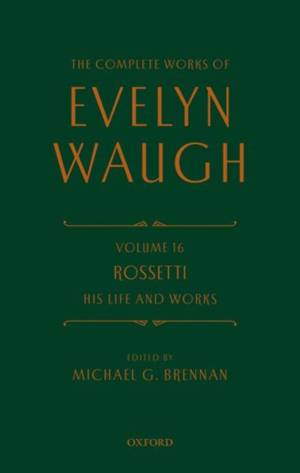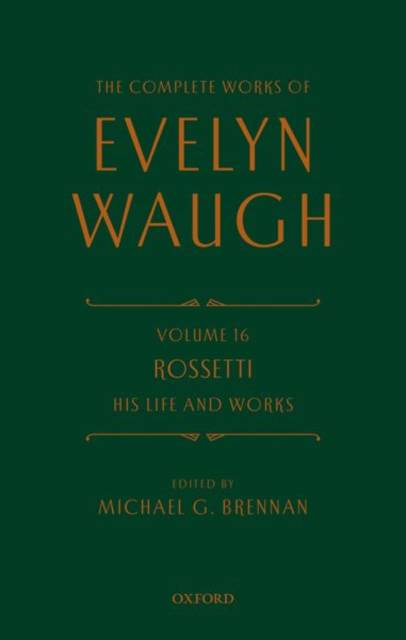
- Retrait gratuit dans votre magasin Club
- 7.000.000 titres dans notre catalogue
- Payer en toute sécurité
- Toujours un magasin près de chez vous
- Retrait gratuit dans votre magasin Club
- 7.000.0000 titres dans notre catalogue
- Payer en toute sécurité
- Toujours un magasin près de chez vous
241,95 €
+ 483 points
Description
The Complete Works of Evelyn Waugh offers the first scholarly edition of Waugh's work, bringing together all of his extant writings and graphic art: novels, biographies, travel writing, short fiction, essays, articles, reportage, reviews, poems, juvenilia, parerga, drawings, and designs. No other edition of a British novelist has been undertaken on this scale. Only 15% of Waugh's letters have previously been published. Alexander Waugh, Evelyn Waugh's grandson, is editing a twelve-volume Personal Writings sequence for the series, intercalating over 10,000 letters with the complete, unexpurgated diaries. All volumes will be beautifully produced, and have comprehensive introductions and detailed annotation. Fiction and non-fiction volumes will also contain a full account of each text's manuscript development and textual variants. The Complete Works will revolutionize Waugh studies, and offer new insights for twentieth-century literary and cultural studies generally. Waughs works are placed in their rich literary and historical context, enabling readers to appreciate for the first time the range and complexity of his thinking and artistic practice, and linking this to the work of his contemporaries in Britain, America and Europe. This volume is part of the Complete Works of Evelyn Waugh critical edition, which brings together all Waugh's published and previously unpublished writings for the first time with comprehensive introductions and annotation, and a full account of each text's manuscript development and textual variants. The edition's General Editor is Alexander Waugh, Evelyn Waugh's grandson and editor of the twelve-volume Personal Writings sequence. This, Waugh's first published book, marked the centenary of the birth of the painter and poet Dante Gabriel Rossetti (1828-1882). Waugh was fascinated by the bohemian lives of the Pre-Raphaelite painters, and by his own family connection with them (William Holman Hunt had married, successively, two cousins of his grandfather). Rossetti is both compassionate towards its subject and critical of his self-destructive nature. The incisive analysis of Rossetti's painterly techniques contributed to the resurgence of public interest in Rossetti's art and poetry. The biography was also an early expression of Waugh's lifelong interest in narrative art, and laid the foundations for his own belief in the importance of the spiritual as well as the aesthetic vision of the artist. Although Rossetti was hastily compiled, it is nevertheless elegant and witty.
Spécifications
Parties prenantes
- Auteur(s) :
- Editeur:
Contenu
- Nombre de pages :
- 368
- Langue:
- Anglais
- Collection :
Caractéristiques
- EAN:
- 9780199683574
- Date de parution :
- 14-11-17
- Format:
- Livre relié
- Format numérique:
- Genaaid
- Dimensions :
- 137 mm x 218 mm
- Poids :
- 480 g

Les avis
Nous publions uniquement les avis qui respectent les conditions requises. Consultez nos conditions pour les avis.






